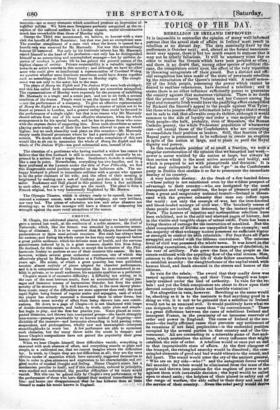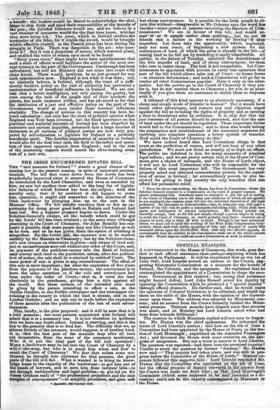TOPICS .: OF THE DAY.
REBELLION IN IRELAND IMPROVED.
IT is impossible to contradict the opinion of many well-informed persons that the actual state of affairs in Ireland must result in rebellion at no distant day. The date nominally fixed by the performers is October next; and, absurd as the formal announce- ment may appear, there is but too much reason to suppose that it may not be utterly fallacious. It will be necessary some day or other to realize the threats which have been paraded so often ; and there is no , doubt that, among other species of political chi- cane, the conspirators count upon the effect of the very repetition in throwing antagonists off their guard. But a distinct and offi- cial recognition has been made of the state of proximate rebellion by the retractation of the Queen's intended visit. A small minor-
ity of the Irish people, possessing the power which cannot be denied to reckless vehemence, have decreed a rebellion ; and it seems there is no other influence sufficiently potent to guarantee the country against that monstrous visitation. There is no doubt that the presence of Queen Victoria and her Consort among the loyal and romantic Irish would have the pacifying effect exemplified by Richard the Second's appeal to the people against Wat Tyler' but those who possess official information have judged that it would not be safe to risk that allowable coup de theatre, although it would summon to the side of loyalty and order a vast majority of the Irish people—the bulk, probably, even of Repeaters, the Roman Catholic gentry, the whole Protestant population of whatsoever cast—all except those of the Confederates Who are attempting to consolidate their position.as leaders. Still, that fraction of the Repeal party is pronounced to be sufficient to create an eruption in spite of the nation at large, and to place in peril the Royal dignity and person. . In this remarkable position of so small a fraction, we note a singular corroboration of the opinion that we hazarded last week— power is never wielded by the nation at large, but always" by that section which is the most active mentally and bodily, and which is prepared to act with promptitude and decision. It is what may colloquially ba called the go" in the Confederate party in Dublin that enables it so far-to pronccence the immediate destiny of its country.
A very horrible destiny. At the freak of a few banded felons --whose policy is not sanctioned even by the wildest prospect of advantage to their country—who are instigated by the most transparent and vulgar anibition, the hope of pleasure and profit from a great and sanguinary national tumult—Ireland is threat- ened with the greatest calamity that man can inflict upon the world : not only the scourge .of war, but the iron-knotted and blood-loaded scourge -of civil war.' The butcherly senses of these people are invited, not deterred, by the instant example of Paris. The horrors of intestine and metropolitan rebellion have been exhibited, not in the cold and abstract pages of history, but in th& visible and tangible shape of actual strife. Paris has been a living theatre of carnage for the instruction of mankind. But the chief conspirators of Dublin are unappalled by the example; and the majority of-that unhappy nation possesses no sufficient vigour or strength to control its arch criminals. For four days all Paris
struggled and reeled the hideous convulsion. The noisome fever of civil war possessed, the whole town. It was heard in the shrieking execrations, in the clamorous meanings of desolation, in the roar of artillery. Pale grew the face of the people as the streets reddened with the appalling flow ofthe -vital stream. Men, crimson to the elbows in the life of their fellow creatures, battled to establish anarchy : the slaughterhouse of the capital stank with human blood, and death steamed in the streets and homes of the citizens.
In vain for the rebels: The sword that they madly drew was turned against themselves,_ and their Titan strength was hope- lessly crushed under the heel of authority. In vain for the re- bels: and yet the Irish conspirators are about to draw upon their devoted country the same futile and horrible visitation! Not altogether in vain, however. Revolting as the scene would
be, shocking as it is to the instincts to find anything good in a thing so vile it is not to be gainsaid that a rebellion in Ireland would not be an unmixed evil. It would positively have what we can designate by no other name than "its conveniences." There is a great difference between the cases of rebellious Ireland and insurgent France, in the proximity of an immense reservoir of order and power in England. The curse of Ireland at the mo- ment—the really efficient cause that prevents any settlement of its vexatidus if not fatal perplexities—is the undecided position occupied by the several parties in that country and of the Go- vernment. All are contending in a miserable game of fast-and- loose which neutralizes the action of every influence that might establish the rule of order. A rebellion would at once put an end to that impracticable state of affairs. At the first clangour of the trumpet, the entangled anarchy would be dissolved ; the com- mingled elements of good and bad would vibrate to the sound, and fall apart. The sound would utter the cry of the ancient general, "Who are on my side—who ?" and the antagonist forces would fall asunder; the rebels would be eliminated from the mass of the - people and thrown into position for the engines of power to act against them with inexorable decision ; the loyal would be called upon to stand aside ; the helpless of them placed in safety out of the range of warfare, the able called to their duty and used for the service of their country. Even the rebel party would derive a benefit; the leaders would be forced to acknowledge the chal- lenge to step forth and meet their responsibility at the ftrazzle of the gun; the deluded followers would see, and we believe in a vast number of instances would for the first time know, whither they were being led. The press, which in Ireland outdbes the trumpeter of the fable for it wields the sword, would be brought within effective control, as the French press has been during the struggle in Paris. There was despotism in the act : who ques- tions it ? But it was a despotism of mercy, which restored peace, and enabled the voice of reason once snore to be heard.
"Sixty years since," there might have been apprehensions that such a state of affairs would facilitate the action of the most cor- rupt tyranny on the part of the Government. Castlereagh has been caricatured, but still his Ministry did not come into court with clean hands. There would, however, be no just ground for any such apprehension now. England is not what it was then; nor, we sincerely believe, is Ireland, although the want of a suffi- ciently decisive policy on the part of authority has prevented a consummation of beneficial influences in Ireland. We are cer- tain that a better intelligence, not only among the gentry, but even among the bulk of the people and of their teachers the priests, has made immense strides, and has advanced so far that the institution of a just and effective policy on the part of the Government would at once render those internal influences available. The change of opinion in this country has been be- yond calculation : not only has the state of political opinion when England was Tory been reversed, but the blind ignorance on the practical and material interests of Ireland has been dispelled by extensive and earnest inquiries, insomuch that a large number of statesmen in all sections of political parties are now duly pre- pared by self-education to legislate for Ireland in a perfectly beneficent spirit. The forcible suppression of anarchy in Ireland would also for the first time open the field to the influx and opera- tion of that improved opinion from England ; and in the rear of the mastering cannon would march the olive-bearing sena- tors of a new :era.



























 Previous page
Previous page